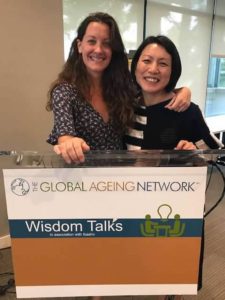The Global Ageing Network welcomed Drs. Emi Kiyota and Taryn Patterson to present on Ibasho at the August “Wisdom Talk” series. Through a photographic presentation, they demonstrated how the Ibasho concept was incorporated in communities in Japan, Philippines, and Nepal.
Ibasho means “a place where you can feel like yourself.” At the heart of the Ibasho concept are the elders. Ibasho incorporates a socio-medical approach. It is an inclusive, empowerment model that views elders as resources rather than spectators. It promotes community, whether in a rural or urban setting, incorporating cultural norms to create a sustainable and integrated center that values elders.
Dr. Kiyota founded Ibasho in 2011 as a 501(c)(3). It was born out of her graduate research while living with elders in long-term care communities. Within the confines of a shady alcove in Nepal, she saw that elders were viewed as a vulnerable population who needed to be cared for by younger generations.
With the rise of an aging population, especially in Asia and Europe, older adults are often perceived to be a burden on society and there are often limited resources that are available to support them. Dr. Kiyota was convinced that a holistic model–incorporating local partners–could be both culturally appropriate and value elders.
The model incorporates 8 principles which are the basis for Ibasho. It starts with a needs assessment, then works to develop a capacity building plan that is designed with community partners and operated by elders. To date, it has focused on lower cost services in less resourced communities.
The model varies according to the needs of its community. For instance, Honeywell Ibasho House partnered with the community of Ofunato, Japan, in February 2012 to create a place where the entire community gathered together and worked to recover from the 2011 earthquake. Older people actively joined in the planning, management, and operation of the Ibasho House. They are recognized as community assets and a source of traditions and wisdom to guide younger generations.
In the Philippines, elders in Barangay Bagong Buhay have developed livelihood projects, including recycling, a vegetable garden, and a mobile Ibasho café, all of which have benefited not only the older people, but also the younger members of the community.
In Nepal, an Ibasho project was launched in which the community decided to include vegetable farming, a potted flower nursery, and bio-dynamic posting.
The primary focus of the Ibasho model is local capacity building in order to foster sustainability and replicability with the intention of generating income from activities they engage in as a community. Dr. Kiyota hopes that the Ibasho concept will be replicated around the world.
“We all know that aging is happening and we need to be the champions for our elders! Older adults should be considered resources; they hold a wealth of knowledge and skill sets which can’t be replicated by technology; and the wisdom to guide us. Elders are the valuable asset of our communities.”
To watch the “Wisdom Talks” presentation, please visit the Global Ageing Network Facebook page.
You need to login in order to like this post: click here

